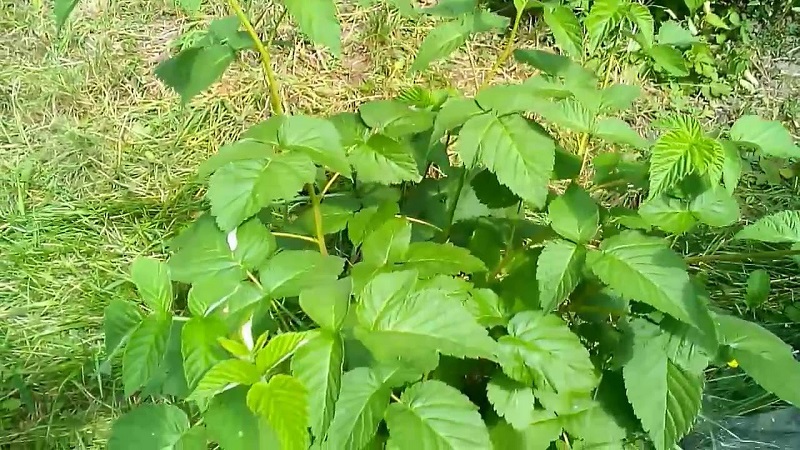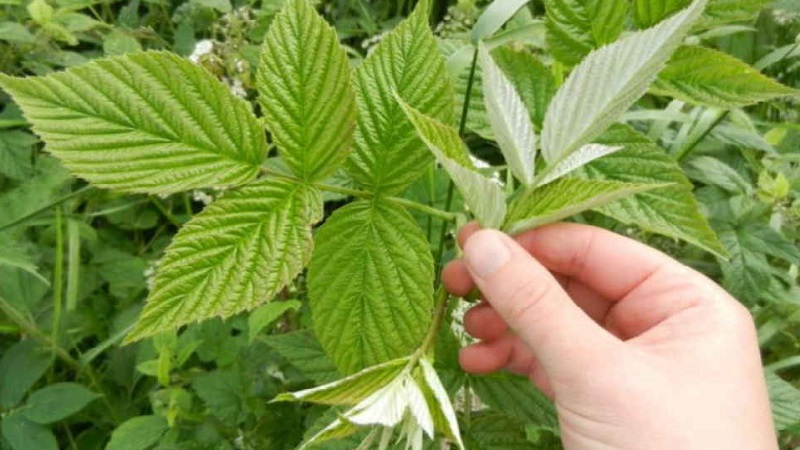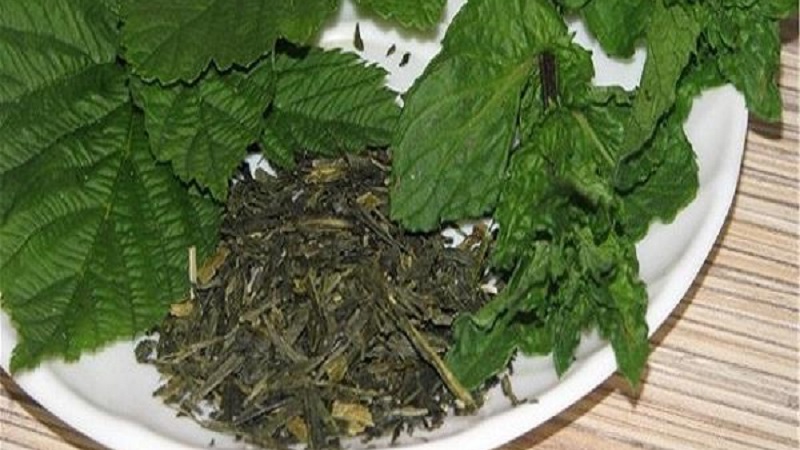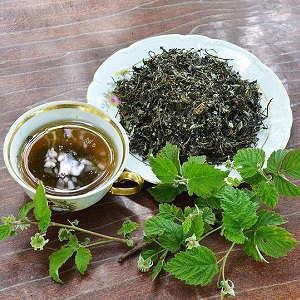How to properly prepare raspberry leaves for the winter for tea at home
Tea is any drink made by brewing prepared plant material. This popular and easy-to-use teabag often contains dyes, preservatives and large amounts of fluoride, which can negatively affect health, bone and teeth strength.
It will be much more useful and cheaper to use tea made from natural plant materials - raspberry leaves. Correctly brewed tea has a beneficial effect on various systems of human organs, which allows us to speak of it not only as a fragrant everyday drink, but also as a preventive and even therapeutic agent.
The content of the article
Can raspberry leaves be used for tea
A decoction, infusion or tea is prepared from raspberry leaves... The drink turns out to be not only tasty and aromatic, but also healthy. It is used as a medicinal raw material for the treatment and prevention of various painful conditions. But in order to preserve all the compounds valuable for the human body in the composition of the leaves, you need to know when to collect and how to dry the raw materials.

Benefit and harm
Raspberry leaves contain vitamins, micro- and macroelements, tannins, pectin, organic acids, essential oils... The most valuable antioxidant for the body is ellagic acid. It strengthens the immune system, neutralizes dangerous free radicals, and improves the state of the nervous system.
Correctly brewed raspberry leaf tea is useful for many diseases and conditions, positively affects the body as a whole and individual organ systems:
- The gastrointestinal tract. It has a pronounced bactericidal effect, increases the protection of mucous membranes, absorbs and removes accumulated toxins and toxins, normalizes metabolism, regulates lipid metabolism.
- The cardiovascular system. Ensures proper functioning of the heart, activates blood flow, dilates blood vessels, increases the strength and elasticity of the vascular walls and small capillaries, prevents thrombus formation, and reduces the levels of "bad" cholesterol in the blood.
- Respiratory system. Useful as a diaphoretic and tonic. It dilutes thick phlegm and accelerates its evacuation, relieves the severity of symptoms of acute respiratory viral infections and acute respiratory infections, inhibits inflammatory processes, inhibits the growth and development of pathogenic microorganisms.
- Urinary system. Stimulates kidney function, cleanses the liver from accumulating harmful substances, serves as a prophylaxis for the formation of kidney stones, liver, bladder.
- Nervous system. Increases overall performance and endurance, relieves drowsiness, activates thinking processes, improves memory, acts as a sedative.
There were no obvious negative consequences of drinking raspberry tea... Shrub leaves, grown without the use of pesticides, do not contain harmful substances and aggressive chemical components, therefore they are well accepted by the body, act softly and effectively.
Side effects are rare and are usually associated with prolonged and abundant drinking if contraindicated.
Raspberry leaves can be harmful to health in such cases.:
- with allergies;
- with increased acidity of the stomach, since the raw materials contain large amounts of organic acids that irritate the mucous membranes of the gastrointestinal tract;
- with erosive and ulcerative diseases of the digestive system - taking such tea increases the painful sensations;
- with constipation - raspberries have astringent properties, therefore, they can further complicate the process of defecation;
- with renal and hepatic insufficiency - the plant has a pronounced diuretic effect and creates an additional load on the organs of the urinary system.
Procurement terms
Raspberry leaves are harvested for drying before bud break - in early or mid-June... During this period, stems and leaves are actively formed, therefore, plant raw materials are of the greatest value.
It is undesirable to collect the harvest during the flowering period of the shrub, so as not to reduce its yield, and in September, when the plant is preparing for winter.
How to collect correctly
Leaves are harvested early in the morning in sunny weather... Wet plant materials take longer to dry and store less. Young leaves are most valued - the first and second group of leaves on the bush, counting from the top. It is undesirable to collect old or leaves from damaged shrubs, as they contain less nutrients.
The leaves are torn off the branch carefully so as not to damage it, and each is carefully examined for integrity, the presence of pest larvae. Leaves suitable for harvesting are bright green in color, without yellow spots, traces of damage by insects.

How to dry
Drying is an important step in harvesting raspberry leaves for tea... The process stops oxidation, reduces the moisture content of raw materials. The quality of the workpiece and the terms of its storage depend on how correctly all the actions were performed.
Interesting on the site:
Drying process:
- Training. Rinse the leaves until clear water, sort out, remove spoiled and yellowed. Then put on a paper towel to absorb excess moisture.
- Drying. In a cool, well-ventilated area, place the raspberry leaves on a newspaper. It is important to avoid direct sunlight. The leaves are constantly turned over so that they do not get stuck.
- Readiness check. Drying takes about five days on average. If the leaves have lost their elasticity, become soft, you can start fermentation.
Raspberry leaf fermentation
Fermentation allows the contained starch to break down into sugars and chlorophyll into tannins... The appearance, aroma and taste of tea are determined by how long the enzymatic oxidation of plant raw materials took place.
There are three degrees of fermentation:
- The leaves are fermented for less than six hours: the drink has a pronounced aroma, leaves a pleasant and soft aftertaste.
- After 10-16 hours of fermentation, the taste of the drink changes: the smell is less pronounced, the taste is tart, maybe with a slight sourness.
- Deep fermentation lasts from 20 to 26 hours. Tea made from such raw materials practically loses its aroma, but it differs in astringency.
Read also:
Watermelon compatibility with milk and other products
Fermentation process:
- Grind well-dried and dried leaves with your hands so that they give juice, or chop with a meat grinder.
- Fill a clean, dry glass jar or an enamel pan with raspberry leaves, cover with gauze on top, put the load.
- Leave at + 25 ... + 27 ° С. The fermentation time depends on personal taste preferences: minimum - 8 hours, maximum - 26. The degree of readiness is determined by organoleptic properties - the workpiece has a green-brown color and rich fruity aroma.
- Then put the raw materials on a baking sheet. Dry in a preheated oven for 2-2.5 hours at a low temperature - + 100 ... + 120 ° С.

Terms and conditions of storage
The dried leaves are stored in a dry sealed container in a well-ventilated place.out of direct sunlight. The blank is also packaged in linen or paper bags. Subject to all the rules of preparation, the shelf life of raw materials is 24 months.
Important! Do not drink tea, the shelf life of which has expired, as it accumulates aflatoxins dangerous for the human body. These harmful substances are formed during prolonged or improper storage, in conditions of high humidity and heat. In large quantities, aflatoxins affect the liver, provoke the growth of cancer cells, and in the worst case, lead to death.
How to brew raspberry leaf tea properly
 To prepare a portion of delicious, aromatic tea, you will need 1 tsp raw materials and 150-200 ml of purified drinking water. Prepared raspberry leaves are poured with boiling water, covered with a lid, insisted for 5-10 minutes. You can brew tea in a thermos.
To prepare a portion of delicious, aromatic tea, you will need 1 tsp raw materials and 150-200 ml of purified drinking water. Prepared raspberry leaves are poured with boiling water, covered with a lid, insisted for 5-10 minutes. You can brew tea in a thermos.
Raspberry leaf tea goes well with fresh fruit... You can add raspberries, black and red currants to it, and replace sugar with honey or raspberry jam.
Tea made from raspberry leaves with lemon is a vitamin remedy that protects against flu and colds, helps relieve the severity of the symptoms of ARVI, ARI. If desired, mint, lemon balm or lemongrass leaves are added to the tea to add freshness and aroma.
Conclusion
Harvesting this delicious beverage requires a responsible approach. You need to find out in advance how to prepare raspberry leaves for the winter for tea, when to collect and how to dry, how and how much to store. The quality of the drink, its benefits or harm to health depends on this. Good tea not only helps to improve overall well-being and heal the body, but also has an original aroma.